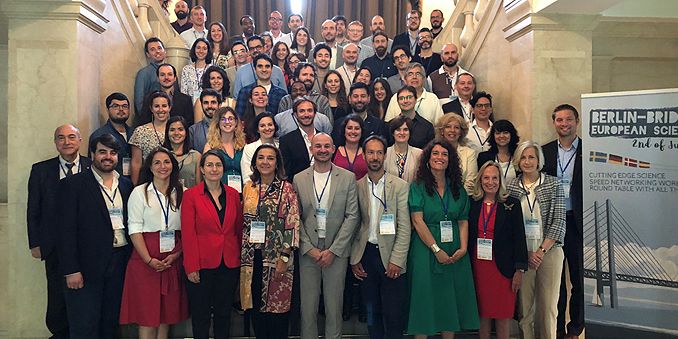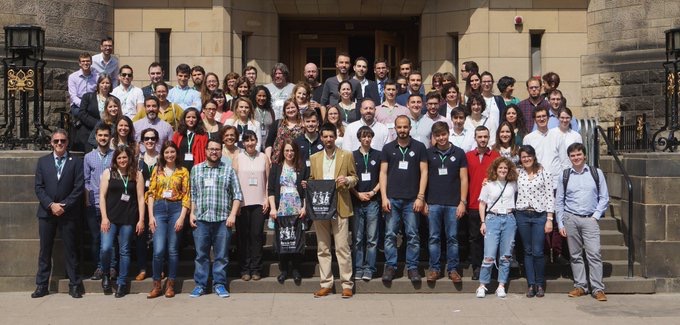FECYT collaborated in the anual symposiums of the associations of Spanish Researchers abroad

Last 2nd and 3rd June, Spanish scientists who are working currently in the United Kingdom, Germany, Denmark and Sweden, all gathered in Glasgow or Berlin. As in previous occasions, these activities had the support and collaboration from the Spanish Foundation for Science and Technology (FECYT) and the Secretary of State for Research, Development and Innovation.
6th International Symposium of the Society of Spanish Researchers in the UK
For the first time, the Society of Spanish Researchers in the United Kingdom (SRUK/CERU) celebrated their annual symposium far from the British capital, specifically in Glasgow. This new location did not discourage the audience, more than 100 attendees who gathered at the University of Glasgow to take a short trip through sciences from the very beginning of humankind to the latest breakthroughs in engineering, biomedicine and robotics.
Different Spanish scientists participated during the journey such as José María Bermúdez de Castro (Prince of Asturias Prize and paleo-anthropologist of the National Research Center on Human Evolution, CENIEH), Xurxo Ayán and Blanca Ochoa who debated about the Altamira Caves, or Javier Arroyo and Manuel Martínez from the Technical University of Valencia who explained the Hyperloop UPV project. An additional set of British experts enriched the programme.
On the other hand, SRUK organized ”Science Zone”: a science outreach festival where more than 85 attendees (including children and adults) had the opportunity to better understand science through the experiments that the researchers presented at the different stands.
SRUK also gave the 2nd Merit Award to Prof Mercedes Maroto-Valer from Heriot Watt University.
FECYT was present throughout the meeting not only at the stand "Science in Spain", but also during professional development workshops for researchers in which we informed about the different scientific funding opportunities available in Spain, at European, national and regional level, for the recruitment of researchers throughout their professional career.
You may check all the details of the Symposium at http://www.sruk2018.com/. You may read an extended summary, here.

2nd Bridging European Science
The societies of Spanish Scientists in Germany (CERFA), Denmark (CED), and Sweden (ACES) gathered at the Spanish embassy in Berlin to celebrate their 2nd Bridging European Science symposium. During this conference, different topics were discussed: from materials chemistry, molecular biology, robotics and artificial intelligence, and sustainable architecture, to science communication and science policy.
Among the Spanish speakers, the president of the Spanish Council for Scientific Research (CSIC) Rosa Menéndez, the cancer researcher Óscar Fernández-Capetillo from the Spanish National Cancer Research Centre (CNIO), Alfons Canals from the company Mind the Byte, Jose de Gea from the German Research Center for AI-Bremen (DFKI), Raúl Rojas González from the Free University de Berlín, the architects Pablo Carbonell and Juan Miguel Galera from Ecoproyecta and Francissco J. Márquez from Swedish Electromobility Centre. Additionally, the scientific journalist Antonio Calvo Roy and the Science Communicator Pablo Izquierdo intervened during the symposium.
In the science policy debate, the three presidents of these associations: Cristina Murcia (CERFA), Hugo Gutiérrez (ACES) and Paula Fernández (CED), discussed with representatives from associations in Spain such as Nazario Martín (COSCE) or Fernando Josa Prado (CRE), among other experts.
During the opening ceremony, the Spanish State Secretary for Research, Development and Innovation Carmen Vela addressed the associations: “I thank you that you are there, that you participate in the Spanish science policy, that you evaluate projects and that you actively participate in the system”.
With the celebration of these meetings, they intend to build bridges for collaboration and international and interdisciplinary scientific cooperation.
You may learn more about these meetings in this article.
Events
- No results available...
Events
- No results available...

